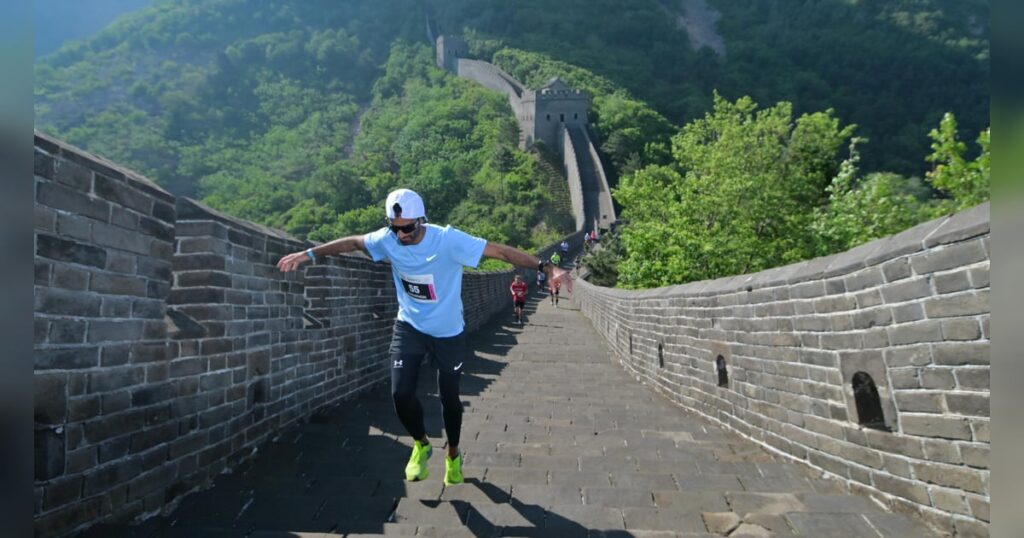Abdulla Bin Hajar Al Shehhi is not just an endurance runner; he’s a testament to what relentless commitment can manifest, both personally and collectively. His recent completion of the Great Wall Marathon—a grueling event threading through one of the world’s most iconic structures, marked by more than 5,000 stone steps—highlights the mental fortitude and reasoned resilience that define endurance athletes.
While races are often viewed through the lens of performance metrics like times and podium finishes, Abdulla’s approach offers insight into a different kind of race: one where the finish line symbolizes something larger than personal achievement. When he crossed the finish line, his thoughts were squarely on the children battling cancer, individuals facing daily challenges that starkly contrast with the athletic challenges he willingly embraces. This perspective shifts the focus from competition to compassion, reflecting endurance’s capacity to forge connections beyond individual ambition.
Abdulla’s journey began over a decade ago with a commitment to personal health. Weighing nearly 100 kilograms, he embarked on a process of transformation, initially characterized by his struggle to remain active. The change catalyzed in 2014 when a simple advertisement sparked curiosity, pushing him to sign up for his first marathon. This threshold moment not only launched his running career but simultaneously laid the groundwork for a broader mission—one that intertwines personal goals with social responsibility. Crossing that first finish line marked the start of a path underscored by reflective practice, wherein each race serves as a chapter in an evolving narrative that transcends individual performance.
His resume now includes 15 marathons, spanning all six Abbott World Marathon Majors. Each race isn’t just a number on a list; it represents lessons learned, adaptations made, and challenges met head-on. This evolution illustrates an essential truth in endurance sports: the path is rarely linear. Abdulla’s ability to navigate the rigors of training alongside demanding work at ADNOC demonstrates a commitment to consistency. Balancing 12-hour shifts on a remote island with rigorous training showcases a lifestyle molded around disciplined practice, a routine that echoes the daily rituals of seasoned athletes. Practicing resilience means finding ways to train effectively, often improvising solutions—running laps around the island at dawn or dusk when the responsibilities of work temporarily fade.
Moreover, Abdulla’s partnership with organizations like the Al Jalila Foundation enriches his journey, highlighting another dimension of endurance: the power borne from communal support and collaboration. Engaging in a cause elevates the physical act of running into a medium for advocacy, amplifying the impact one has on society. Here lies a critical takeaway for endurance athletes: purpose fuels persistence. Endurance isn’t just a solitary venture; it thrives on establishing connections, whether they be with fellow athletes, communities, or specific causes that resonate deeply. This is evident in Abdulla’s commitment to raising awareness about childhood cancer—his mission a testament to the understanding that his runs carry history and hope.
In an era where metrics and results often dominate discussions, Abdulla’s mindset reshapes what victory means. His participation in demanding events is not just about pacing oneself or beating personal bests; it’s about the relentless commitment to stand firm in solidarity with those fighting battles beyond the realm of sport. The Great Wall Marathon, often regarded as a test of physical limits, becomes more than a race to him; it transforms into a symbol of shared struggles and resilience.
Moreover, the mental strategies that endurance athletes cultivate—those nuances of pacing and mindset—become even more profound when applied to broader contexts. Every mile endured is a testament to adaptability, a reminder that setbacks and challenges do not solely reside on race day. Just as Abdulla speaks to the need for setting and sticking to goals, experienced athletes know that this principle extends far beyond the physical realm. It’s about maintaining focus, embracing discomfort, and pushing through barriers that may surface, whether they manifest as fatigue, injury, or emotional strain.
In the depths of long runs, it’s common to confront a myriad of thoughts and doubts. Abdulla’s journey serves as a powerful reminder of the significance of those moments. It’s in the silence of oneself during enduring exertion that we often stumble upon our truest motivations—the whispers of why we lace up our shoes and hit the road. Understanding that endurance transcends individual struggles to embrace collective tenacity fosters empathy within the athlete community.
The clearest takeaway, in the end, is this: endurance is as much about the grit we endure as it is about the connections we cultivate along the way. As athletes, our journeys are laced with opportunities to support not only our own goals but also the struggles of others. Whether navigating a tough training block or racing toward a personal milestone, remember that every step can signify unwavering resolve—not just for oneself, but for the strength we can inspire in others along the journey.
